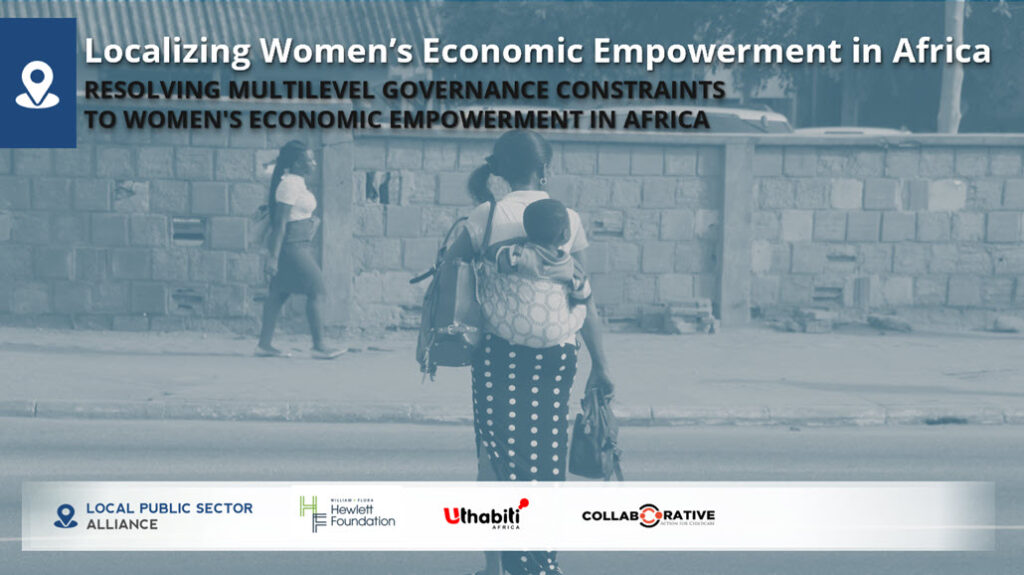
Ineffective multilevel governance (MLG) systems often present obstacles as well as opportunities for inclusive governance and inclusive, sustainable development.
In the area of gender equity and women’s economic empowerment, weakly empowered local governance institutions, misaligned incentives, and ineffective intergovernmental (fiscal) systems may form a systemic ‘macro-level’ binding constraint to the public sector’s ability to support women’s economic empowerment (WEE) interventions, such as ensuring improved access to affordable, safe and quality childcare. This is most likely the case in Africa and Asia, where local governance institutions are often not optimally empowered to respond to the needs and priorities of their constituents.
In the absence of a catalyst to bring together stakeholders from all government levels, along with policy experts, women’s advocacy organizations, and policymakers from both the MLG and WEE Communities of Practice, along with this binding constraint to women’s economic empowerment is unlikely to be identified and brought into mainstream policy discussions, let alone be resolved.
With this in mind, LPSA – together with numerous partner organizations – aims to launch the project ‘Localizing Women’s Economic Empowerment in Africa’ in Nairobi, Kenya, on March 6, 2024.
Through this project, LPSA will engage with global, regional, national, and local partners—especially in Kenya and Ghana—over the next two years (2024-2025) to promote the adoption, funding, and implementation of intergovernmental policy solutions for women’s economic empowerment as a gender-responsive ‘macro-level’ (or multilevel) policy response that supports all women’s opportunities, access to resources, well-being, and agency.
For instance, a well-developed conditional grant scheme that supports local (e.g., county-level) women’s economic empowerment efforts and provides funding to improve access to affordable, safe and quality childcare is likely to garner considerable political and institutional support at all levels.
The project will enable LPSA to leverage its understanding of multilevel governance systems as a convenor and catalyst, by working with lead partners—Uthabiti Africa and Collaborative Action for Childcare in Kenya, and the Institute for Local Government Studies, Ghana—to convene and strengthen women’s rights organizations, childcare policy advocates and other civil society actors, as well as national policy makers, local governments and local government partners, researchers and think tanks, as well as development partners and IFIs to develop and advocate for local-level WEE interventions through improved MLG policymaking and implementation.
The project budget plan for the initial two years of ‘Localizing Women’s Economic Empowerment in Africa’ is approximately $260,000 (2024-2025). The Local Public Sector Alliance has applied for funding support from the Hewlett Foundation to support this project’s activities over this period.
| Project | Localizing Women’s Economic Empowerment in Africa |
|---|---|
| Project Manager | Jacqueline Muthura |
| Project Funder | Hewlett Foundation / LPSA (GOS) |
| Project Budget | $ 260,854 |
| Project Period | January 2024-December 2025 |
PROJECT DOCUMENTS
Project Document: ‘Localizing Women’s Economic Empowerment in Africa’ (Local Public Sector Alliance, March 2024).
Localizing Women’s Economic Empowerment in Africa: Project Launch Blog (March 6, 2024)
Localizing Women’s Economic Empowerment in Africa: Project Launch Meeting Presentations (Part I / Part II)
Localizing Women’s Economic Empowerment in Africa: Progress Report 2024 (April 2025)
PROJECT REPORTS
County Funding of Childcare in Kenya: How much fiscal space is there? (September 2025)
Devolution And Multilevel Governance As An Obstacle And Opportunity To Childcare In Kenya (Forthcoming)
Illustrative National Standards For The Registration And Licensing Of Childcare Facilities And Home-Based Childcare Providers In Kenya (Forthcoming)
The County Government’s Role in Childcare in Kenya: A Policy Vision For County Government Leadership (Forthcoming)
For further information, contact Ms. Jacqueline Muthura (Project Manager).
Page last updated: September 2, 2025

